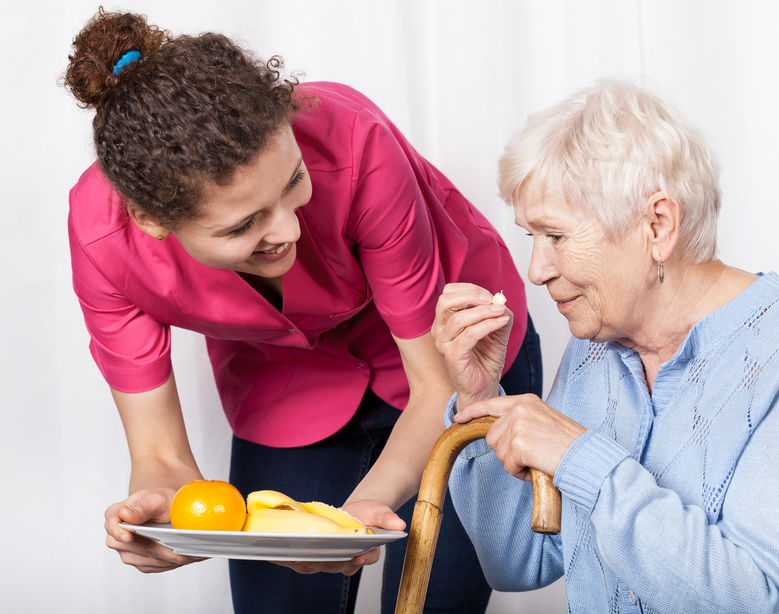Tips for Eating When Food has Lost its Thrill
It’s not uncommon for seniors to lose their enthusiasm for food. The National Institute on Aging points out: “Medications, like antibiotics and pills to lower cholesterol and blood pressure, can sometimes change how food tastes.” Also, taste and smell can diminish with age, making food less enjoyable.
Proper nutrition is essential to wellness, and it’s unfortunate that eating can become a chore, rather than a pleasure. Thinking strategically about meeting seniors’ nutritional needs can help. After all, the better nourished they are, the better they will feel.
When food has lost its thrill, a thoughtful and creative approach to nutrition is worth the effort.
Create a nutrition mindset:
When food doesn’t taste good, think about it as a different kind of motivator. It’s not: “I’m eating this because the experience is pleasant.” Rather it’s: “I’m eating this because it makes me feel energized and strong.” That’s how you get seniors onboard to make their nutritional needs a priority.
Remind them of that awful, vapid feeling they get when they don’t eat. The habits they garner can help them avoid that. Not only will eating well and regularly help them to feel their best, it keeps them safer by making them less likely to get faint or lightheaded and risk falling.
This can be a hard sell, but every bite helps them achieve their wellness goals. Routine is important. They don’t have to eat large meals; eating regularly and meaningfully is key.
Be strategic:
Use every opportunity strategically. Make sure plenty of high protein foods are available and easy to grab such as eggs, nuts, yogurt, and cheese. Hard boiled and deviled eggs make a great, high protein snack. While there once was a lot of concern about eggs, the current thinking indicates that their health benefits outweigh cholesterol concerns. Encourage seniors to discuss this with their doctors if they have concerns.
Lean proteins are important, so keep plenty of poached chicken, tuna, and lean meats around for quick sandwiches and salads. Avoid processed meats since these are high in sodium. You want to put together easy meals that will be a snap for seniors to make for themselves.
Calcium is very important too. Did you know that leafy green vegetables, nuts, broccoli, beans, quinoa, tofu, and black strap molasses are excellent sources of easily absorbed calcium? The bonus is these foods also contain other vitamins such as A, D, K and are rich in potassium.
Think, too, of whole grains that are easy to have in the pantry - granola, brown rice, bread, bagels, whole grain crackers. Pay attention to the quality of each food item.
Fruit and veggies at the ready
An article in the Harvard Health Newsletter explains: “The fresh food you eat is loaded with nutrients necessary for good health, such as magnesium, calcium, and vitamins A and C. But many older adults aren't getting enough nutrients from their diets.” The article points out that while taking vitamin supplements can help nutritionally, “nutrients are most potent when they come from food.”
Remind your senior loved one of the importance of keeping up their diets with a variety of fruits and vegetables. Pay attention to what fruits and veggies they like, and make sure to have those around and ready to go. Keep veggies in the fridge, cut and ready for snacking, for example. Serve cut fruit with soups and sandwiches. Emphasize the importance of their daily intake of fruits and veggies, and encourage them to try new things - pomegranates, squash, seasonal fruits and veggies.
These foods are valuable, not just for their vitamins, but also for the fiber. It’s much more satisfying to eat a dish of strawberries, grapes, or oranges than to drink a chalky glass of fiber powder. Fruits and veggies make the bodies’ systems function optimally. When your loved one relies on them, they may be able to rely less on over the counter supplements and medications. It’s a win-win.
Remember:
Pay attention and monitor seniors’ weight to ensure that they aren’t losing pounds. Depression and other illnesses can cause them to lose interest in food. Always emphasize the importance of maintaining good communication with their doctors.
Eating healthy is a habit. Helping seniors develop it, even when their relationship with food has changed, is their key to wellness.
How can one of our Angel companions help your loved one? The options are almost unlimited. When you choose Visiting Angels for at-home senior care, we’ll work with you to create a plan for care that addresses your loved one’s individual needs. Care is always scheduled for the times you need it and can be modified as needed to adjust to changing needs.
Some of the most common activities we help with include:
- Diet monitoring including planning for and preparing meals
- Light housekeeping including help with laundry, making beds and vacuuming
- Assistance with shopping, running errands, and transportation to appointments or activities
- Assistance with bathing, dressing, grooming and toileting
- Reminders to take medications, drink fluids and eat regularly
- Going for walks, engaging in favorite activities and friendly companionship
To schedule an appointment or to learn more about our at-home senior care services, give us a call today to get started at 919-968-3724!
